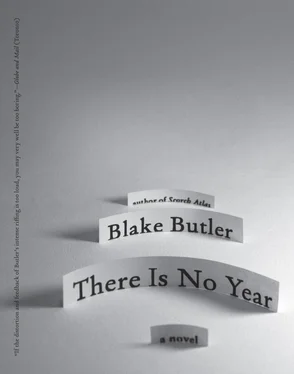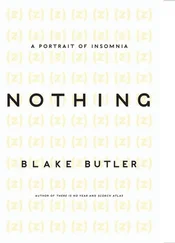The mother had some idea of what she’d say when asked, if ever. Some homes had bells that shook her sternum, or would play a song she knew she knew. Some homes seemed to quiver right along, as would their home, leaning. The mother imagined herself inside each home’s walls as she touched them — inside not sleeping, hearing herself at the door. At certain doors she tried the keys she’d crammed fat in her pockets, but in the locks they’d spin and spin.
She guessed men’s names into the crack, a string of fathers’ names hidden inside her, names of those who too had lost . She tried Antoine, Paul, Stanley, James; she tried Tom, Kim, Ken, John, Jim, Ray, Edward, Robert; she tried a name she could not quite name . The names stuck to her mouth. These names came from somewhere in her, she could hear them, coming on and on, and trailing off. .
The mother tried her name, then her mother’s, then the father’s, then the son’s. No one would come. The homes went on hearing. The homes would stand there. Overhead the sky cracked up with old light — light that sometimes seemed to form a map. The neighborhood went on regardless, even when the mother hid her eyes.

The son lay with his cell phone between his pillow and his head, the way the mother had made him swear he would. She’d bought the phone in case of relapse— but relapse into what? The son could not remember. He had to wear the phone on him at all times. What if he could not find her? The mother could not stop thinking. Sometimes in her thoughts the mother would explode as balls of heat and crud and light.
The son’s phone was purple by most opinions, though sometimes it might appear blood red or translucent.
The son had set up a mirror at the foot of the bed that he could look in and see himself, as well as what might be in the room around him. So much of most rooms were never watched. Many people had used this room before the son, the son knew. Sometimes he felt they were still there. Some mornings he would wake up and the mirror would have turned slightly, rotated to one side, which the son attributed to his sleep-kicking, learned from his mother, held inside her. Some mornings the mirror would be turned around entirely, so that the son woke to the mirror’s flat brown back. Sometimes he’d find the mirror in other rooms inside the house.
There were sometimes other copies of the mirror.
The son also tended to talk in his sleep quite a bit, though neither he nor any other had heard anything he’d said while sleeping, ever. The sleeping son knew when to shut up. Most nights the son could not sleep at all.
The son concentrated on one body part and then another, approaching nowhere. The phone rang against the son’s face. The son rummaged, found the ringing, and took it open. Inside the phone there someone spoke — someone not the mother. The son said something back. His voice felt chalky, caught inside him. Inside the house the house stood still. The someone took what the son had said and said it back just slightly different, sounding almost like the son himself.
The room was dripping. A string of stinking lights. The phone against his head, a squeeze of wires, warm as fire among day.
The someone went on saying the same thing over and over, warbled and rushing, in a loop. Within the loop, by slips in repetition, the voice took the tone of something else: a buzzing, beeping. It raised abrasions on the son’s chest, the patchy pale skin puffing up with shapes like words. In the room downstairs, just below the son, the pucker in the wall grew slightly bigger. In the mirror the son saw nothing. The silver surface had a little curdle.
The son could not get the phone off of his face.
The windows sweating. The skin along the son’s wrists and forearms firming, fitted as with gloves. His cells, in sound, becoming ordered, torn up — the house inside the son so calm.
The son’s arms felt deboned — fuzzy, how they’d felt in those sick months — months during which each night the man had appeared above his bed. The son had not mentioned the man to anyone, not his mother, even during all those weeks she’d never left him, never let go of his hand — not even when the man appeared right there beside her. The man had been there on the first day the son started feeling sick. He’d walked right up to the son in the cafeteria. A hairy man, with covered head. He’d come to the table and stood above the son and reached and touched the son across his face — his lips — his jaw. The man had slid his thumb into the son’s mouth, just like that. He’d spoken through the finger, in a voice. The man with the yellow shirt neck pulled so loose. The man who’d stood and stood and stood, looking at the son until the son closed his eyes and he felt the fat crooked thumb expanding and when he’d looked again he wasn’t there — just the whole long school room full of children eating lunches, silent — the adults against the school walls watching with their heads cocked — no one said anything about it, even after the man was gone. The next day the son could not sit up.
The son was certain this person on the phone now was not the same man as that man then, but he knew they knew each other. He didn’t know why he knew that. He sensed something at the window but he refused to look. The man inside the cell phone had been talking all this time.
The mother mowed the yard again. She mowed the yard, the yard, a prayer. The mother was slick with sweat and slather. Her skin was red in certain places from sun and where she’d scratched herself to keep the ants and bees off. The insects swarmed her head no matter how fast she moved. They had wings and teeth and eyes. They swarmed the yard, the street, the long horizon. The mother had mowed the yard twenty-seven times in the last week. Sometimes she’d go on for hours. Her biceps and pectorals were getting meaty. The grass was going dead around the edges from where the mother had pushed the mower so much. The mother kept her eyes wide and turned her head back and forth from side to side. Where was the man who’d fixed the mower? What else could he put a hand to? All those surrounding lawns on all those houses.
The father was still gone. That morning he’d left sometime just after 4 a.m. and he would probably not be home till after midnight. His face seemed to be sinking into his features. The mother tried to think of the father’s name. She could think of lots of other names it might have sounded like, but not quite the right one, she knew. She mouthed out things she’d said before — she reversed her rehearsed vows, teasing her tongue toward the father. She mowed the yard in wicked zigzags, reckless with her aim. The mower devoured her newer flowers — begonias, ivy, mums. They were dying anyway. She ripped up one long sod piece, spurting mud on the walk. Underneath the sod, the insects hung, spaghetti. The mother kept pushing, head up, chest out, scrunching her face best into something someone watching could sometime want.
The mother did not see the son watching through the window on the second floor where there may not have been a window once before.
The mower soon grew heavy. The handle hurt her hands. The mother went on garbled grunting, as if trying to push something from her insides. Around a corner by the chain fence, she felt the mower suck something up. Metal clanged against the blades. There was a whirring, choke and smoke. It spat something out its side. The mower whirred a little longer and then got tired, then was gone. The mother squatted on her haunches in the trampled mud-mushed grass, her eyes stung with gasoline and sweat, the sky behind her slightly hulking. In the grass there, slushed with clippings, scarred, the mother saw the egg.
Читать дальше













